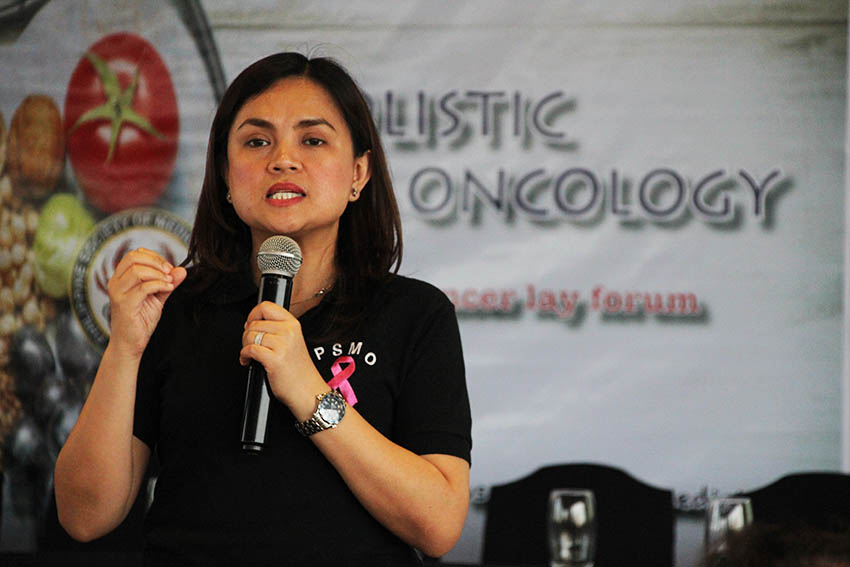
BEWARE. Dr. Ellie May Villegas of the Philippine Society of Medical Oncologists warns the public about food supplements claiming to be substitutes for conventional cancer treatment. Villegas said most advertised food supplements, if not actually effective, actually interfere with chemotherapy, causing even more problems. Villegas was among the resource persons of the forum titled “Holistic Oncology: Understanding Complementary versus Alternative Medicine” held at the Marco Polo Hotel on Friday, April 21. (Paulo C. Rizal/davaotoday.com)
DAVAO CITY, Philippines — A group of doctors specializing in the treatment of cancers warned the public on Friday about several herbal food supplements advertising as replacements for traditional cancer treatment, such as radio and chemotherapy.
“Usually, some patients would go to my clinic to ask for replacements to chemotherapy and radiation. Unfortunately, there’s nothing in literature that says that,” said Dr. Omid Etemadi of the Philippine Society of Medical Oncologists.
Etemadi said that there are actually very few scientific evidence to prove that these food supplements work, and at best, can only complement traditional treatment.
Apart from the lack of scientific evidence proving the potency of these food supplements, Etemadi said some of the purported “anti-cancer” supplements could interfere with treatment and may cause more problems.
Etemadi cited the case of grape seed extract, which interferes with the metabolism of tamoxifen, a drug that blocks the action of estroge, which in turn, is used to treat certain types of breast cancer.
He also warned against drinking too many herbal food supplements, saying this may “stress” the liver because it may be impairing its ability to metabolize properly.
With that, Etemadi advised the public to consult their doctors before taking any food supplements.
“Don’t hide it from your doctor. Actually we’re not against it if you want to take other pills. We just want to make sure that you’re drinking the correct supplements to avoid endangering you,” he said.
Meanwhile, another oncologist, Dr. Ellie May Villegas, said it could take many years of rigorous testing and clinical trials before the efficacy and safeness of a drug could be assured.
Villegas said that Xanthone, a compound extracted from the mangosteen, was proven to have positive effects only in the in vitro stage, which means it was only tested on cells in a test tube. Uson said this is only in the preliminaries, and has not been tested yet on animals, or humans.
Villegas also warned the public about “alternative practitioners” pitching their claims directly to the media, because it only emphasizes the purported “benefits” without discussing the possible side effects.
“We do not go on TV to discuss scientific treatment because it has to be explained in person by a medical professional,” Villegas said.
For his part, Food-Drug Regulation Officer III of the Food and Drug Administration, Willison John De Luna admitted that the marketing strategies of food supplements is not the responsibility of the FDA. De Luna said that while they are consulted in the content, ultimately, it is the Advertising Standards Council, an independent regulating agency that approves the commercials.
Nevertheless, De Luna encouraged the public to report to the FDA any food supplement with any suspicious and “outrageous claims” for further investigation.
“Let’s be critical on how to deal with this information, what are their evidences, sources, for example. In the end ang isipin natin dito ay public health, and if does this product really has an effect not just on us, but to the people who are taking this product,” De Luna said. (davaotoday.com)










